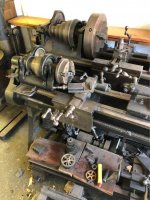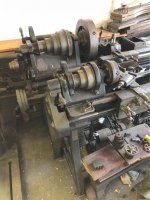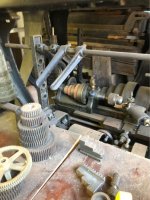Probably they all will thread - most metal lathes can or will since for 200 years that has kind of been a salient point of metal lathes.
Question is: do you want to go there? Best answer is: it depends.
I kind of get a kick from using a 150 year old machine and achieving 0.001. They still work. Can they do 0.0001? No way in heck. And in the using one develops "skills" to offset the 150 years of wear and inconsistency. Like don't tighten that chuck where the paint mark is because a tooth is missing and one jaw will move without all the rest moving to follow.
As in you "know" your machine. Your machine works with you just as you work with it. You have a much more "interactive" machining session and in the doing become something more than just a mark counter/wheel turner/chucker-upper/switch turner on-ner.
I could call it a "craftsmanship" sort of relationship. Similar to hewing with an axe. The craftsman expresses himself with the axe and yields something far greater than merely removing wood chips to a pattern or dimension. I'm not sure a craftsman can really express how and what he does, any more than I can express how and what I do when I use the antique lathe.
At least part of the challenge IS the challenge. And part of the reward is overcoming the challenges.
But there is also the thought of the history. How many hands put their fingers on the ball-cranks and went with the same objective. How many sons learned at the knee of their masters in the same peripheral space to achieve the same thing. How long did it sit between uses since that "other" lathe was found "more useful, easier, more consistent" in it output? Big emphasis on the "easier" since that is human nature.
Machine work is not always about output - its certainly about getting from A to B, usually but not always the easiest way possible. And - in their way - these machines do that in style - and with a certain pinache.
But its not for everybody...we do need the producers to support the few of us who deal more exclusively in pinache.
Joe in NH
Edit to a different subject: The small lathe between two others perhaps second in line as the stack is arranged MAY be a Ames Chicopee Tool-maker's lathe of common discussion here. The tailstock is different - perhaps a late created model - but parts of the lathe appear similar including dovetails on the upper surface of the carriage for attachment of "devices" - a convention not usually followed on a lathe of only 10 inch swing.






